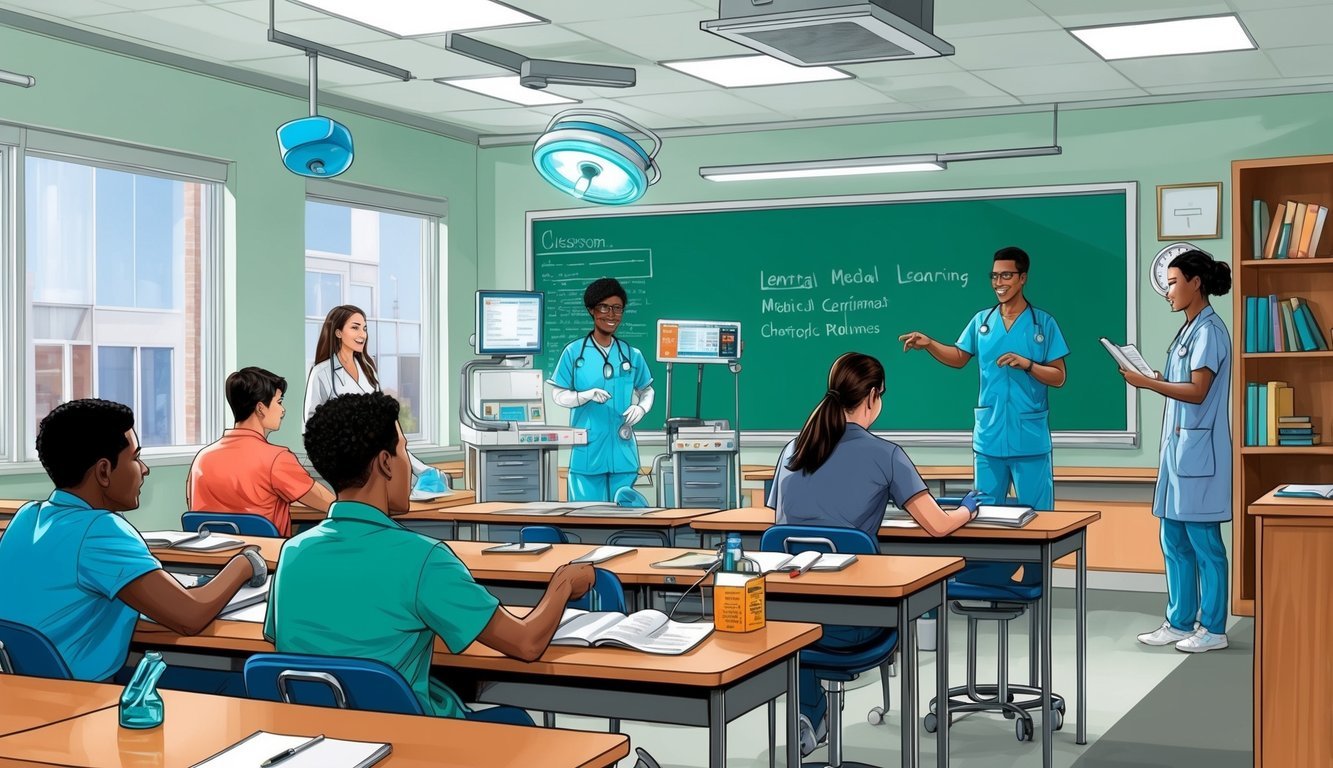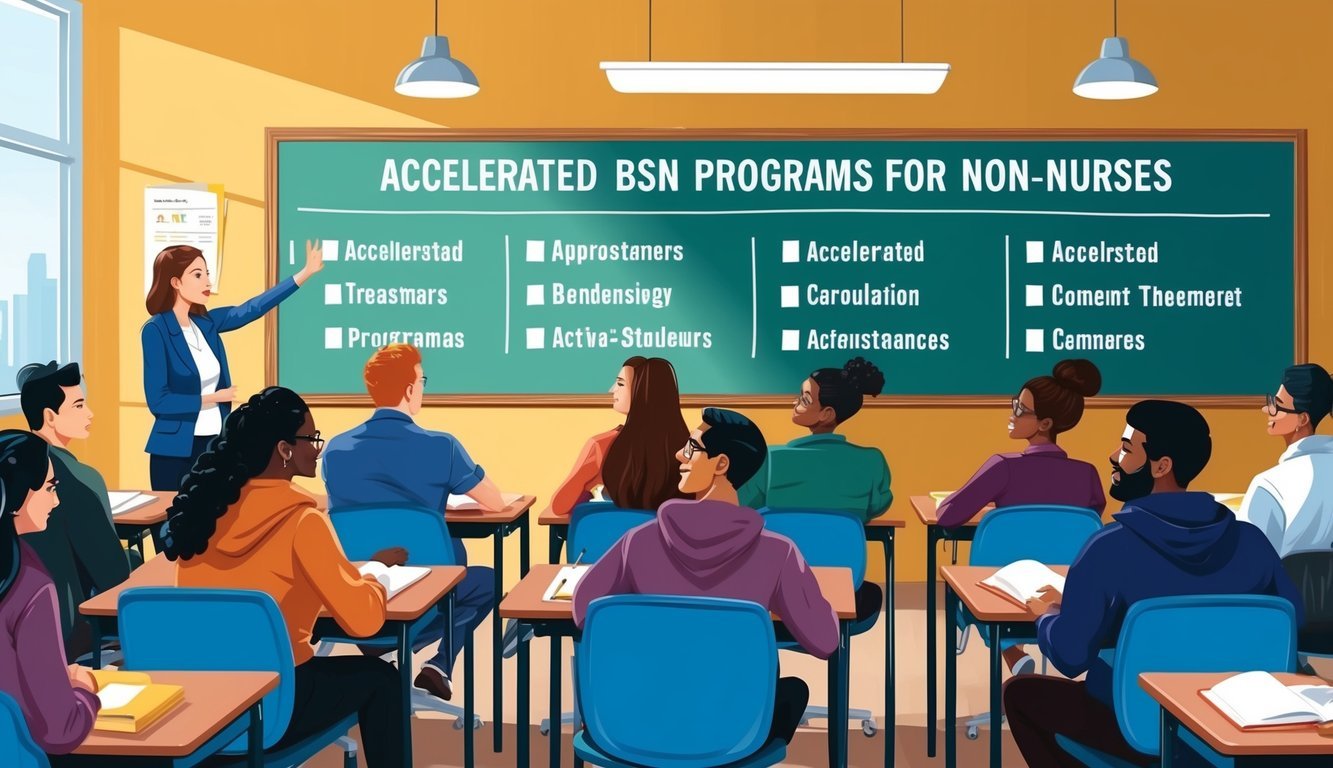Accelerated BSN programs are increasingly popular among individuals looking to transition into nursing from non-nursing backgrounds.
These programs enable you to earn a Bachelor of Science in Nursing (BSN) in a condensed timeframe, often in as little as 12 to 18 months.
These programs are designed to equip you with the essential skills and knowledge needed to become a Registered Nurse swiftly, opening up a rewarding career in healthcare.
The appeal of an Accelerated Bachelor of Science in Nursing lies not only in the speed of completion but also in the flexible learning options available.
Many institutions offer online coursework combined with in-person clinical experiences, allowing you to balance your studies with personal and professional commitments.
This flexibility is particularly beneficial for non-nurses looking to advance their careers without sacrificing their current jobs or responsibilities.
In navigating your options, consider the program requirements and the reputation of the institutions you are interested in.
Renowned programs, such as those at Emory University and Baylor University, provide rigorous training and valuable clinical experiences.
By fully exploring these accelerated paths, you can transition into a fulfilling nursing career more efficiently.
For more details, explore resources about online Accelerated BSN programs.
Understanding Accelerated BSN Programs
Accelerated Bachelor of Science in Nursing (ABSN) programs offer a pathway for individuals looking to transition into the nursing field efficiently.
These programs are particularly designed for those who already hold a bachelor’s degree in a non-nursing discipline, enabling a swift route to earning a nursing degree.
What is an ABSN?
An Accelerated BSN program is a rigorous educational track that allows students to obtain a Bachelor of Science in Nursing in a shorter time frame, typically around 12 to 18 months.
These programs combine online coursework with on-ground clinical training to enhance learning flexibility.
The curriculum usually covers essential nursing concepts, patient care, and clinical skills.
The program’s structure is intensive, demanding strong commitment and time management from students.
Many graduates find that the fast pace and comprehensive training prepare them well for the nursing workforce.
ABSN programs vary, but all result in eligibility for the NCLEX-RN exam, which is necessary to become a licensed registered nurse.
For instance, you can explore options like Thomas Edison State University’s ABSN that feature online classes delivered asynchronously.
Who Can Enroll in ABSN Programs?
ABSN programs primarily target career changers who already possess a bachelor’s degree in another field.
If you are looking to make a switch to nursing, these programs can be ideal for you.
Many institutions also welcome applicants with diverse educational backgrounds, fostering a rich learning environment.
Admission requirements typically include a completed application, transcripts from prior degrees, and possibly standardized test scores.
Some programs may require prerequisites in subjects such as biology and chemistry.
It’s essential to research specific program criteria, as they can differ.
For example, renowned programs like Emory University’s ABSN offer a strong reputation, frequently cited as a top choice for aspiring nurses.
You can find more information about such programs at NursingProcess.org.
Admission Requirements and Prerequisites
To enter an accelerated Bachelor of Science in Nursing (BSN) program, you must meet specific admission requirements and complete prerequisite courses.
Understanding these criteria helps streamline your application process and prepares you for success in the program.
Prerequisite Courses and Experience
Most accelerated BSN programs require certain prerequisite courses that you must complete before enrollment.
Commonly required courses include:
- Human Anatomy and Physiology
- Microbiology
- Psychology
- Statistics
Each course typically needs a grade of at least a C or better.
Additionally, some programs may expect you to have hands-on experience, such as volunteering or working in healthcare settings.
This experience offers insight into the nursing field and enhances your application by demonstrating commitment.
Application Process and Deadlines
The application process for accelerated BSN programs can vary by institution, but generally includes these key components:
- Online Application: Complete the application form on the school’s website.
- Transcripts: Submit official transcripts from all previous institutions.
- Personal Statement: Write a personal statement detailing your motivation for pursuing nursing.
- Letters of Recommendation: Provide 2-3 letters from academic or professional references.
Be mindful of deadlines, which often fall several months before program start dates.
It’s essential to regularly check the specific program’s website for the most accurate information.
For instance, you can find details on specific programs at Nursing Process or Nurse.org.
Curriculum and Clinical Training

The curriculum of accelerated BSN programs integrates nursing theory with practical skills, ensuring that you gain a comprehensive understanding of nursing practice.
Clinical training is a vital aspect of your education, providing hands-on experience in various healthcare settings.
Nursing Theory and Practical Skills
In accelerated BSN programs, you will engage in rigorous nursing coursework that covers essential topics such as health assessment, pharmacology, and evidence-based nursing practice.
These courses are designed to provide you with a solid foundation in both the theoretical and practical aspects of nursing.
You will also participate in lab experiences where you can practice skills like administering medications, conducting physical exams, and using medical equipment.
This combination of theory and practical skills prepares you for the demanding responsibilities of a nurse.
Clinical Rotations and Experiences
Clinical rotations are a crucial component of your training, allowing you to work directly with patients under the supervision of experienced nurses and instructors.
These rotations typically occur in various healthcare settings, such as hospitals, outpatient clinics, and community health organizations.
You will have opportunities to apply your knowledge in real-world situations, enhancing your clinical judgment and critical thinking skills.
The exposure to different specialties will help you understand the diverse roles within nursing.
Your clinical placement enhances your competency, ensuring you are well-prepared to enter the profession with confidence.
Program Length and Format Options

When considering accelerated BSN programs for non-nurses, understanding the various program lengths and format options is crucial.
These aspects directly impact your learning experience and time commitment.
Full-time vs. Part-time Enrollment
Accelerated BSN programs typically offer full-time and part-time enrollment options.
Full-time programs usually last about 12 to 18 months, enabling you to complete your degree quickly.
These intensive schedules often include a combination of lectures, simulations, and clinical practice.
In contrast, part-time options allow you to balance your studies with work or other commitments.
While these programs may extend to 24 months or longer, they provide greater flexibility.
Consider your personal commitments when choosing between these options, as each format has unique demands.
On-Campus vs. Online Program Structures
Accelerated nursing programs can be delivered in on-campus or online formats.
On-campus programs often involve hands-on training and laboratory experiences, crucial for developing nursing skills.
They usually require you to attend classes and participate in clinical residencies at designated facilities.
Online accelerated nursing programs offer a more flexible approach.
These programs allow you to complete theoretical coursework through online courses, freeing up time for practical experiences.
Many institutions incorporate on-campus residencies for essential hands-on training.
This blended format ensures you gain the necessary clinical skills while maintaining a flexible schedule.
Licensure and Career Outlook

Pursuing an accelerated Bachelor of Science in Nursing (BSN) program prepares you for the NCLEX-RN exam, which is essential for becoming a registered nurse.
This section explores the preparation for the licensure exam and the various employment opportunities available post-graduation.
Preparation for the NCLEX-RN Exam
Completing an accelerated BSN program equips you with the necessary knowledge and skills for the NCLEX-RN exam.
This licensure exam tests your understanding of nursing competencies essential for safe and effective patient care.
Your curriculum typically aligns with the exam’s requirements, including:
- Pharmacology
- Patient care techniques
- Vital signs monitoring
- Critical thinking skills
Many programs offer NCLEX-RN preparation courses, practice tests, and study materials to help you succeed.
Passing the NCLEX-RN is crucial as it leads to obtaining your nursing license, allowing you to practice as a registered nurse.
Employment Opportunities After Graduation
Passing the NCLEX-RN will expand your career options significantly.
Registered nurses can find roles in various healthcare settings.
These include hospitals, outpatient clinics, long-term care facilities, and home health care.
With additional experience or education, you can explore advanced roles like nurse practitioner or clinical nurse specialist.
For example, pursuing a Master of Science in Nursing (MSN) or a Doctor of Nursing Practice (DNP) can help you achieve this.
The Bureau of Labor Statistics projects significant growth in job opportunities for registered nurses.
This makes nursing a stable career path.
The demand for skilled nurses emphasizes the versatility and potential for advancement in the nursing profession.

